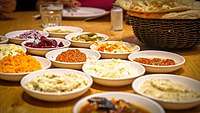Kasha
In the English language, kasha usually[lower-alpha 1][lower-alpha 2][lower-alpha 3] refers to pseudocereal buckwheat or its culinary preparations. In various East-Central and Eastern European countries, kasha can apply to any kind of cooked grain. It can be baked but most often is boiled, either in water or milk, and therefore the term coincides with the English definition of porridge, but the word can also refer to the grain before preparation, which corresponds to the definition of groats. This understanding of kasha concerns mainly Belarus (каша), Czechia (kaše), Lithuania (košė), Poland (kasza), Russia (каша), Slovakia (kaša) and Ukraine (каша), where the term, besides buckwheat, can apply to wheat, barley, oats, millet and rye. Kashas have been an important element of Slavic diet for at least one thousand years.[1]
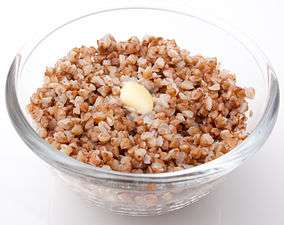 Buckwheat kasha | |
| Type | Porridge |
|---|---|
| Main ingredients | Cereal (buckwheat, wheat, barley, oats, millet or rye) |
This English-language usage probably originated with Jewish immigrants, as did the form קאַשי kashi (literally translated as "porridges").[2]
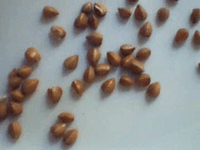
.jpg) Buckwheat with onions
Buckwheat with onions
In Russia
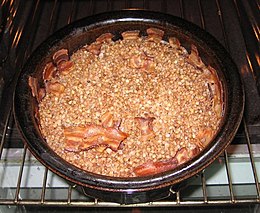
The largest gross buckwheat consumption per capita is in Russia, with 15 kg (33 lb) per year followed by Ukraine, with 12 kg (26 lb) per year.[3] The share of buckwheat in the total consumption of cereals in Russia is 20%.[4]
In Russian, buckwheat is referred to formally as гречиха (grechikha) and buckwheat grain and buckwheat groats as гречневая крупа (grechnevaya krupa) or гречневая каша (grechnevaya kasha). Informally, buckwheat grain and buckwheat groats are called гречка (grechka). Corresponding words in Yiddish are gretshkes/greytshkelach and retshkes/reytshkelach.
The most popular kasha recipe in Russia is that of crumbly cooked buckwheat seasoned with butter. Buckwheat kasha can be eaten at any time of the day, either as a separate dish or as a side dish. Other popular kasha recipes are made with millet, semolina (манная каша) and oatmeal. Cooked with milk and sugar, they are often seen as a breakfast staple, especially for children. Pearl barley porridge is less popular but also eaten.
Kasha is one of the Russian national dishes, together with shchi. This fact is commemorated in the Russian saying, "щи да каша – пища наша" (shchi da kasha – pishcha nasha), which literally translates as "shchi and kasha are our food" or "cabbage soup and porridge are what we eat". The expression has an implied figurative meaning of "it is enough to eat that two meals to live" or "it doesn't matter what happens in Russia at large, we still live the same way."
Butter is often eaten with most kasha recipes, hence another Russian saying: "you'll never spoil kasha with a lot of butter".[5]
In Poland
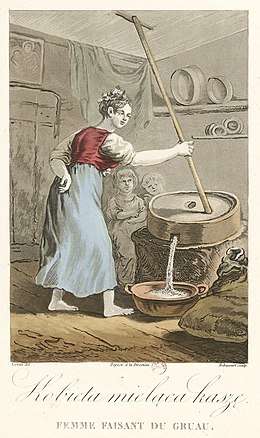
In Polish, cooked buckwheat groats are referred to as kasza gryczana. Kasza can apply to many kinds of groats: millet (kasza jaglana), barley (kasza jęczmienna), pearl barley (kasza jęczmienna perłowa), oats (kasza owsiana), as well as porridge made from farina (kasza manna).[6] Bulgur can be also referenced to as a type of kasza in Polish language (kasza bulgur).
As Polish blood sausage is prepared with buckwheat, barley or rice, it is called kaszanka (kasha sausage).
Annual (2013) per capita consumption of groats in Poland is approx. 1.56 kg (3.4 lb) per year (130 g (4.6 oz) a month).[7]
In Czechia
In Czech the cognate kaše (Czech pronunciation: [kaʃɛ]) has a wider meaning that also encompasses mashed potato (bramborová kaše), pease pudding (hrachová kaše), etc.
In Ashkenazi Jewish culture
As an Ashkenazi-Jewish comfort food, kasha is often served with onions and brown gravy on top of bow tie pasta, known as kasha varnishkes.[8] Kasha is a popular filling for knishes[9] and is sometimes included in matzah-ball soup.
See also
Notes
- Merriam-Webster's Dictionary definition: a porridge made usually from buckwheat groats, "Merriam-Webster's Dictionary". Retrieved 21 May 2020.
- Oxford Dictionary definition: (in Russia and Poland) porridge made from cooked buckwheat or similar grain., "Lexico". Retrieved 21 May 2020.
- Collins Dictionary definition: dish originating in Eastern Europe, consisting of boiled or baked buckwheat, "Collins English Dictionary". Retrieved 21 May 2020.
References
- Molokhovets, Elena (1998). Classic Russian Cooking. Indiana University Press. p. 331.
- Steinmetz, Sol. Dictionary of Jewish Usage: A Guide to the Use of Jewish Terms. p. 42. ISBN 0-7425-4387-0.
- No 8 [008] 26 жовтня, 2007; [www.agro-business.com.ua/.../1655-2013-06-25-11]
- Russian Market of Buckwheat in 2009 - September 2010 Archived 2016-03-03 at the Wayback Machine
- Nourish Your Language: Foodie Words Refashioned
- "Polish Food 101 ‒ Groats". Culture.pl. 9 April 2015. Retrieved 21 May 2020.
- Biuletyn Informacyjny ARR 4/2013, Handel Wewnętrzny 4/2013 IBRKK
- "Le Cordon Jew". May 22, 2008. Retrieved 2011-01-15.
- "Archived copy". Archived from the original on 2007-04-21. Retrieved 2007-05-22.CS1 maint: archived copy as title (link). Retrieved May 30, 2007.
External links


